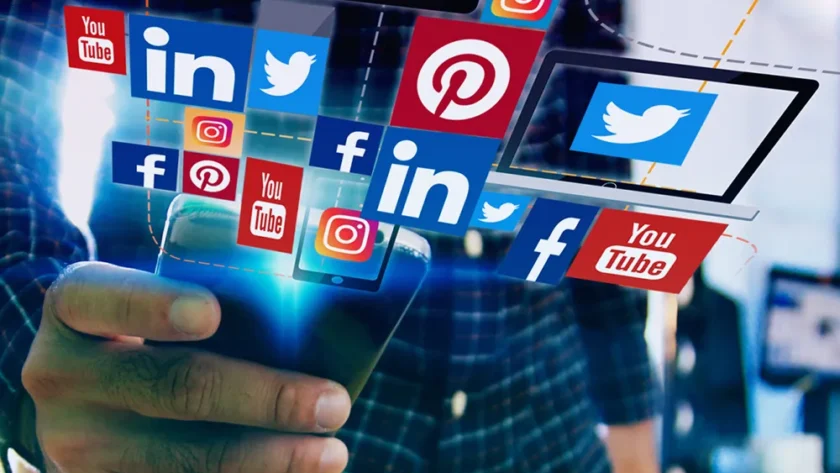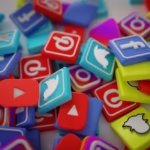Social media has revolutionized the way we communicate, share information, and interact with the world. From platforms like Facebook, Instagram, and Twitter to newer entrants like TikTok, social media has become an integral part of our daily lives. It has transformed how businesses market products, how we connect with friends and family, and even how we engage in political discourse. However, like any powerful tool, social media comes with both benefits and challenges. In this article, we’ll explore the power of social media, how it shapes society, and how you can use it wisely to enhance your life, business, and online presence.
1. The Evolution of Social Media
Social media platforms have evolved over the years. From simple online communication tools like MySpace and Friendster to today’s multi-faceted platforms, social media has expanded to include everything from photo and video sharing to instant messaging and live streaming. The rise of mobile devices, particularly smartphones, has further accelerated social media’s influence, making it accessible at any time and from anywhere.
a. Early Days of Social Media
The early 2000s saw the rise of platforms like MySpace, which allowed people to create personalized pages and connect with friends. Facebook, initially created for university students, quickly gained popularity worldwide by offering a more structured platform for social networking. By the late 2000s, Twitter’s 140-character messages and LinkedIn’s professional networking site brought new dimensions to social media.
b. The Explosion of Visual Content
In the 2010s, social media began to shift toward a more visual experience with the rise of Instagram, Pinterest, and Snapchat. These platforms capitalized on the growing desire for visual storytelling and encouraged users to share photos and videos. Video platforms like YouTube also gained massive popularity, transforming entertainment and content creation.
c. The Age of Live Streaming and Short-Form Content
Platforms like TikTok and live-streaming services (such as Twitch) brought about a new wave of social media usage, where users engage with short, entertaining content in real time. These platforms have given rise to a new generation of influencers and content creators who make a living off their social media presence.
2. The Power of Social Media
Social media is a powerful force in modern society, and its influence extends far beyond just personal use. Here are some ways social media impacts our world:
a. Connecting People Across the Globe
One of the most powerful aspects of social media is its ability to connect people across different regions and cultures. It has made it easier than ever to stay in touch with family and friends, meet new people, and engage in meaningful conversations with individuals worldwide.
b. Empowering Businesses and Entrepreneurs
For businesses, social media has become a valuable marketing tool. Brands can use platforms like Instagram, Facebook, and Twitter to connect with their target audience, promote products, and even provide customer service. Social media has also empowered small businesses and entrepreneurs to reach wider audiences without the need for traditional advertising.
c. Shaping Public Opinion and Political Discourse
Social media has transformed political campaigns, public discourse, and activism. Hashtags like #BlackLivesMatter and #MeToo have sparked social movements and raised awareness on important issues. Political figures and organizations now use social media to connect with voters, promote their agendas, and build public opinion.
d. Creating a Platform for Content Creators
Social media has provided an opportunity for content creators to share their work with a global audience. From influencers and vloggers to amateur photographers and writers, social media allows individuals to showcase their creativity, build a personal brand, and even monetize their content.
3. The Challenges of Social Media
Despite its many benefits, social media also comes with its fair share of challenges. Here are some of the most significant concerns associated with its use:
a. Mental Health and Well-being
Social media can have negative effects on mental health, especially for young people. Studies have shown that excessive social media use can lead to feelings of isolation, anxiety, and depression. The constant exposure to idealized versions of other people’s lives can create unrealistic expectations and foster feelings of inadequacy.
b. Privacy Concerns
As social media platforms collect vast amounts of personal data, privacy concerns have become a major issue. Users’ personal information, habits, and preferences are often used for targeted advertising, raising concerns about data security and the ethical use of personal data.
c. Misinformation and Fake News
The spread of misinformation and fake news is another significant challenge posed by social media. The viral nature of social media means that false or misleading information can quickly gain traction, leading to confusion, fear, and even political unrest. Fact-checking and media literacy are essential in combating this issue.
d. Cyberbullying and Harassment
Social media platforms can sometimes serve as a breeding ground for cyberbullying and online harassment. The anonymity provided by the internet can embolden individuals to engage in hurtful or harmful behavior without consequences, leading to negative psychological effects on the victims.
4. How to Use Social Media Wisely
Given the impact of social media on our lives, it’s important to use it wisely and responsibly. Here are some tips to help you navigate the world of social media:
a. Be Mindful of Your Time
Social media can be addictive, and it’s easy to spend hours scrolling through your feed without realizing it. Set boundaries and be mindful of your screen time. Consider using apps that track your usage and set daily limits to help you stay in control.
b. Protect Your Privacy
Always be mindful of the personal information you share online. Adjust your privacy settings to limit who can see your posts and personal details. Be cautious about oversharing, especially on public platforms, and remember that once something is posted online, it can be difficult to fully erase.
c. Curate Your Feed
Social media can be a source of negativity, so it’s important to curate your feed by following accounts that inspire and uplift you. Surround yourself with content that aligns with your interests, values, and goals. Unfollow or mute accounts that make you feel bad about yourself.
d. Engage Positively
Social media should be a platform for constructive conversations and positive engagement. Be respectful and thoughtful in your interactions, and be mindful of the impact your words may have on others. Spread kindness and support causes that align with your values.
e. Fact-check Before Sharing
Before sharing any news or information, take a moment to verify its credibility. Look for reputable sources and fact-check the information to ensure it’s accurate. This helps combat the spread of misinformation and ensures that you’re contributing positively to the conversation.
5. Conclusion
Social media has become a powerful tool that shapes our daily lives, influences our opinions, and connects us to people and ideas from around the world. While it offers many benefits, such as fostering communication, empowering businesses, and creating opportunities for content creators, it also comes with challenges like mental health concerns, privacy issues, and misinformation. By using social media mindfully and responsibly, we can harness its power to connect, inform, and entertain, while avoiding the negative impacts it can sometimes have.




